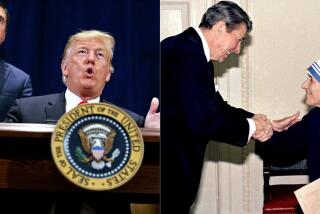Win or Lose, Forbes Should Be True to Himself : *GOP: Dissembling to woo the right dilutes his limited government message--and won’t work.
- Share via
Steve Forbes is not going to be the next president and probably won’t be the 1996 Republican nominee, but he could well derail Bob Dole in the coming weeks. Such an act of king-unmaking would guarantee him more than a place in the history books; he would have a chance to shape a positive future-oriented agenda for the GOP. So it would be a calamity if Forbes frittered away his national credibility in vain pursuit of the votes of a few hundred thousand cultural conservatives in the early caucus and primary states.
Forbes had one big idea: that government is too big and too powerful. In Madison Avenue parlance, his “unique selling proposition” was the flat tax. Shrewdly, Forbes always pitched his plan in populist, not economic, terms: “The fairest tax,” he said over and over again, “is one that cuts out the special interests, cuts out the lobbyists, cuts out the politicians.”
Today, Forbes’ support for the flat tax is also his greatest weakness. The magazine magnate can express his idea in crisply simple sound bites, but his detractors have begun miring him in swampy detail. For example, excluding dividend and interest income is good economics--such income having already been taxed at the corporate level--but bad politics. It appears to be, as Phil Gramm and others have said, a tax solely on wages. Adds Pat Buchanan, “The idle rich have got to pay something.” Had Forbes spent more time market-testing his plan, he would have fixed such bugs before his pitch hit the airwaves. After all, if the GOP can’t sell Medicare cuts that will cost the average senior citizen an extra $11 a month, what are its chances of selling a 100% tax cut for Palm Beach coupon-clippers?
Forbes says that he is more than a single-issue candidate. Indeed, a common philosophical thread runs through not only his flat-tax advocacy but also his support for school vouchers, medical savings accounts and privatized Social Security. Furthermore, if the goal is to drain the Washington swamp, then term limits are a useful tool; as Forbes argues, “It’s hard to trust politicians, especially if they’ve been in Washington, D.C., for a long time.”
But an important aspect of the New Jerseyan’s early appeal was the symmetry of his message. If Forbes didn’t want Uncle Sam making economic decisions for people, he also didn’t want to see government intervention in their private lives.
When he began campaigning, Forbes said he wanted abortion to “disappear.” Echoing arguments made by Bill Bennett, he declared that abortion could never be ended by legislation alone, any more than drinking was ended by Prohibition. What was needed, Forbes added, was “a change of heart, change of attitude, a change of consciousness.” The same instincts led him to support President Clinton’s don’t-ask-don’t-tell position on gays in the military.
As the Forbes campaign took off, his left-in-the-dust rivals fired social-issue missiles at the candidate’s personal 727. Gramm has labeled Forbes “liberal,” while Buchanan says, even more inaccurately, that Forbes is “pro-abortion.”
If Forbes had been willing to stick to his principles, then Republican voters would have had an honest choice: between those candidates who are consistently for limiting government and those who are not. Instead, he trimmed. He now indicates that he would agree to a ban on abortion after all, except for rape, incest and threats to the life of the mother. And he also seems to be backing away from his earlier live-and-let-live stance on gays in uniform.
Why has Forbes flip-flopped? He evidently has made the calculation that he can actually win the nomination if he makes himself more acceptable to the Christian right. But the man who once called Pat Robertson a “toothy flake” will never be their champion. Meanwhile, as he chases after that elusive evangelical bird in the bush, Forbes risks losing the bird he holds in his hand, his libertarian base of support.
If Forbes’ candidacy is to have long-term significance and if he is to have a political future, he will have to take honest stands based on principle, not expediency. At the Republican convention in San Diego this summer, Forbes likely will have the opportunity to showcase his platform of “hope, growth and opportunity”--even as he endorses someone else for the November election. His bright vision is a worthy successor to Ronald Reagan’s “shining city on a hill.” But for Forbes to be an effective messenger in August, he will have to be true to himself today.
More to Read
Get the L.A. Times Politics newsletter
Deeply reported insights into legislation, politics and policy from Sacramento, Washington and beyond. In your inbox three times per week.
You may occasionally receive promotional content from the Los Angeles Times.









